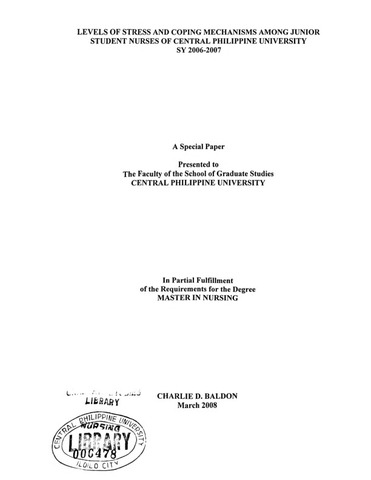Levels of stress and coping mechanisms among junior student nurses of Central Philippine University SY 2006-2007
Abstract
This study was conducted to determine the levels of stress and coping mechanism among junior student nurses of Central Philippine University SY 2006-2007.
Specifically, this study aimed to:
1) describe the characteristics of junior student nurses in terms of gender, monthly family income, living arrangement and academic performance;
2) determine the levels of stress among junior student nurses;
3) determine the coping mechanisms among junior student nurses;
4) determine whether levels of stress vary according to gender, monthly family income, living arrangement, and academic performance;
5) to determine whether there is a significant relationship between the characteristics of junior student nurses in terms of gender, monthly family income, living arrangement, academic performance and levels of stress; and
6) to determine whether there is a significant relationship between the characteristics of junior student nurses in terms of gender, monthly family income, living arrangement, academic performance and coping mechanisms;
7) to determine whether there is a significant relationship between the levels of stress and coping mechanisms among junior student nurses.
The one-shot survey design was used in this study. The target population consisted of 551 junior student nurses of CPU SY 2006-2007. From this, a sample size of 231 junior student nurses was obtained. The desired sample was drawn using stratified random sampling with proportionate allocation to ensure that students were adequately represented in the sample.
Data were collected using a self-administered questionnaire. The instrument generated to gather data on the characteristics of the respondent, their levels of stress and their coping mechanisms.
The instrument on levels of stress was drawn from respondents thru question and answer adapting a standardized list developed by Seligman from Web Survey (2005). 16 item questionnaire on coping mechanisms was adapted from Folkman and Lazarus “Ways of Coping Checklist” on the coping styles of students. Descriptive statistics such as frequency distribution and percentages and mean were employed to analyze data. For the inferential analysis, Chi-square, gamma coefficient were utilized. Significance of the obtained chi-square and gamma coefficient was set at 5 percent level. To test for significance of the difference between or among means. The Z-test and ANOVA were respectively used. The statistical software (SPSS) for Windows Version 11.0 was used in processing and analyzing the data.
Major Findings
The respondents of the study were mostly female. Apparently, the nursing department of the CPU College of Nursing is dominated by female students which are true to all nursing schools in the Philippines.
Most of the families of junior student nurses were high income earners.
The majority of the respondents were living with their parents, who were the important source of social support among college students.
As to academic performance junior student nurses have average grade in all major nursing subjects.
The majority of the respondents were stressed by the demands and pressures in studying nursing.
The students reported that they had used the four coping mechanisms namely: planning and hoping, seeking social support, self-controlling and escape-avoidance when under stress. Of the four strategies planning and hoping and seeking social support were singled out to be the most used strategies.
The characteristics of junior student nurses in terms of gender, monthly family income, living arrangement and academic performance do not significantly influence respondents’ levels of stress.
The characteristics of junior student nurses in terms of gender, monthly family income, living arrangement and academic performance do not significantly influence respondents’ coping mechanisms. Regardless of their stresses, almost all students sought planning and hoping, seeking social support and self-controlling, while only few used escape-avoidance.
The analysis shows a significant relationship between the students’ levels of stress and their choice of coping mechanisms. The students tend to plan and seek social support. This finding did not support the hypothesis that there is no significant relationship between levels of stress and coping mechanisms. Level of stress therefore, is significantly associated with their coping mechanisms. This is consistent with Lazarus Transactional Stress Theory which states that stress is any event in which environmental demands, internal demands, or both, tax, or exceeds the adaptive resources of an individual. The individual responds to perceived environmental changes by adaptive or coping responses.
Conclusions
Based on the significant findings of the study, the following conclusions and generalizations are derived:
1. Females outnumbered the males among the junior student nurses of Central Philippine University SY 2006-2007. This implies that nursing is still dominated by females.
2. The characteristic of junior student nurses in terms of gender, monthly family income, living arrangement and academic performance do not significantly influence respondents’ levels of stress.
3. Looking at the positive and negative indicators of stress, it shows that students have positive responses towards their stressful experiences.
4. On the whole, most of the junior student nurses were stressed with the demands and pressures in studying nursing.
5. Majority of the respondents utilized planning and hoping and seeking social support strategy to cope with their stresses.
6. Among the major types of coping mechanisms employed by the respondents, planning and hoping and seeking social support were the most used strategy, while escape-avoidance and self-controlling were least used.
7. The characteristic of junior student nurses in terms of gender, monthly family income, living arrangement and academic performance do not significantly influence respondents’ levels of stress.
8. The characteristic of junior student nurses in terms of gender, monthly family income, living arrangement and academic performance do not significantly influence respondents’ coping mechanisms.
9. Level of stress is significantly associated with their coping mechanisms. This is consistent with Lazarus Transactional Stress Theory which states that stress is any event in which environmental demands, internal demands, or both, tax, or exceeds the adaptive resources of an individual. The individual responds to perceived environmental changes by adaptive or coping responses.
Recommendations
In view of the above significant findings, and conclusions of this study, the following recommendations are hereby given:
1. Students should be taught different stress management techniques to improve their ability to cope with a demanding professional course.
2. News magazines, journals, videos, mass media such as TV and radio can be used as a venue for information dissemination for they are highly effective and most common source of information in relation to stress.
3. Parental involvement in education is important because this will make them aware about stress management, time management and improve behavior management techniques to reduce stress level.
4. Clinical instructors, student advisors, guidance counselors, and school heads should be provided with additional information about stress through lecture, seminars and other educational activities to gain more knowledge and skills that will help them understand better the special needs of student with stress.
5. Special course/training teacher for academic changes in quality of teaching and evaluation system should be given as part of education curriculum.
6. Having been informed of the results of the study, the students concerned will somehow be guided in realistically discovering more about themselves, the possibilities for self-improvement in relation to stress.
7. Further studies should be done in order to establish the relationship between levels of stress and coping mechanisms and use of other factors or characteristics in order to relate it properly with the levels of stress.
Description
Abstract only
Suggested Citation
Baldon, C. D. (2008). Levels of stress and coping mechanisms among junior student nurses of Central Philippine University SY 2006-2007 (Unpublished Master's thesis). Central Philippine University, Jaro, Iloilo City.
Type
Special paperSubject(s)
Keywords
Department
School of Graduate StudiesDegree
Master in NursingShelf Location
GSL Theses 610.73072 B193
Physical Description
ix, 73 leaves
Collections
- Master in Nursing [37]



